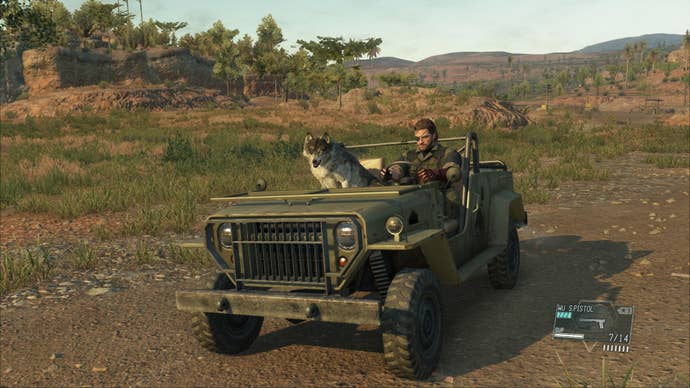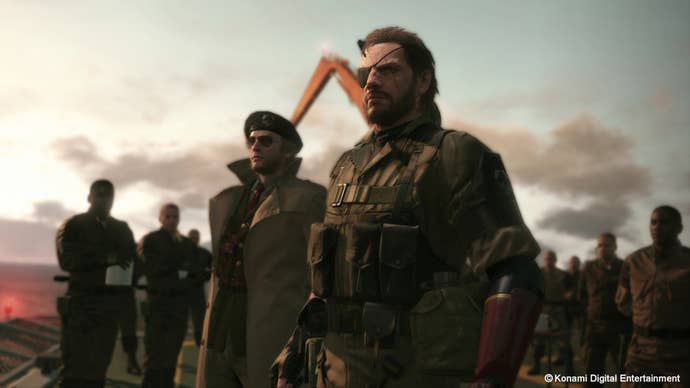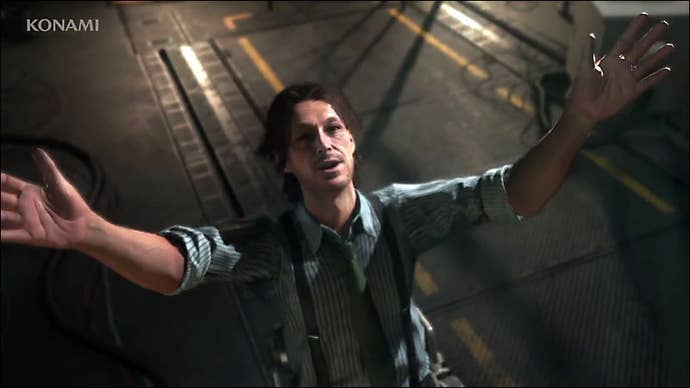Does Metal Gear Solid V Hold Up? The Definitive Experience and the Missing Chapter
In the wake of The Definitive Edition announcement, we look back on Hideo Kojima's final act at Konami and wonder why a major piece of the story is still on the cutting room floor.
This article first appeared on USgamer, a partner publication of VG247. Some content, such as this article, has been migrated to VG247 for posterity after USgamer's closure - but it has not been edited or further vetted by the VG247 team.
Another holiday season is almost upon us (yikes), which means it's time to do that think we do and look back on last year's biggest games. First up? Metal Gear Solid V: The Phantom Pain - a game that has inspired much discussion in the year since its original release.
The timing works especially well because Konami just announced their "Definitive Version," which will include Ground Zeroes and a handful of DLC but not the much-desired Mission 51. According to Konami, Mission 51 was never intended to be the game's actual ending, all but killing any hope that it will eventually find its way into a complete version. Naturally, plenty of fans are upset, but it begs the question of whether Metal Gear Solid V needs Mission 51 to be successful. Let's discuss.
Note: Spoilers abound! Please keep that in mind as you read this piece.
What we said at the time
From my review at the time: "The hardest thing about writing this review is that Metal Gear Solid V defies an actual score. I can point out the occasional bouts of repetition and filler, but there's no question that it is a masterfully executed game that will figure heavily into this year's Game of the Year discussions. Even at its most annoying, when you die deep in an enemy base and have to wind all the way through its defenses again, it's undeniably absorbing. It makes you want to try your best. If this is truly Hideo Kojima's swan song, then it is a terrific end to a distinguished career. Something tells me he's not done, though. If The Phantom Pain is any indication, he still has a great deal to contribute to gaming. I look forward to seeing what's next."
Metal Gear Solid V was one of the crazier reviews I've ever done. It involved flying down to LA for a week and basically being locked in a room from 9am to midnight for three solid days. By the time I emerged babbling from Konami's sensory deprivation chamber, I was barely able to form a coherent thought, let alone a review. Thus, I opted to start MGS V as a review-in-progress so I could get some distance and spend some time with the game in the comfort of my own home.
The game itself was vintage Kojima: bold, cheesy, smart, and often flatout crazy. At times it could be insanely frustrating - fighting a mass of powerful Skull commandos while trying to steal a truck, for instance - but the sandbox-like gameplay mixed extremely well with the refined stealth mechanics. Irritating as it could be, it was absorbing as hell, and one of the generation's most attractive games to boot. Oh, and it had D-Dog - the best dog.

In hindsight...
I see a lot of fans say, "Metal Gear Solid V was a fabulous game, but not a great entry in the Metal Gear Solid series." The main knock against it seems to be that its mission-based structure makes for a less coherent and interesting story. At a minimum, it's quite different from the Metal Gear Solid that we know and love.
My own memory is of a game filled with effective story moments: The fight with the boy who would become Liquid Ocelot, the initial duel with Quiet, the virus that overtakes Mother Base and kills your favorite soldiers, the hospital scene reminiscent of Resident Evil 4. Mother Base also has plenty of effective moments of its own, encouraging you to explore and delve into various side-stories.
Of course, this being a Metal Gear Solid game, the story is also completely bonkers. You have a lady who has to breathe through her skin, a virus that lays dormant until certain words are spoken, and a zombie fire monster. And there's the most controversial element of all: The big retcon that establishes that the Big Boss we know from the original Metal Gear is not the one introduced in Snake Eater - still the best game in the series.
After all this time, I'm still not sure how I feel about it. Kotaku's Jason Schreier made a pretty good argument for why it was a bit of a messy copout. We think we get to see Big Boss complete his evolution into the villain of the original Metal Gear, and it's not even really him. It doesn't exactly ruin the series - the Big Boss we get in Metal Gear 2 and beyond is very much a product of Peace Walker and its successors - but it serves to undo a lot of the buildup from the previous games.
But this is Metal Gear, and the lore is so twisted and convoluted at this point that having two Big Bosses is pretty much par for the course (hell, there are at least three Snakes). Story aside, there's so much about Metal Gear Solid V's gameplay that works. Just the act of riding around on your horse or meticulously plotting out a raid on a heavily-defended base is great. It features a nice amount of weapons and companions, and it's refreshing in the way that it generally lets you take things at your own pace.
Alas, the online hasn't held up quite as well. Metal Gear Online ended up being panned by critics and fans alike, and the Forward Operating Bases - platforms where two players could play a game of cat and mouse - ended up feeling like pointless distractions. Luckily, Metal Gear Solid V could be enjoyed just fine with the online components turned off.
The content since release
As I mentioned above, Konami announced earlier this week that they are releasing Metal Gear Solid V: The Definitive Experience, which will include MGS V, its prologue Ground Zeroes, Metal Gear Online, and the various DLC, most of which consists of weapons and costumes.
There is, however, an omission: The aforementioned Mission 51, which sets up a confrontation with Eli and finishes laying the groundwork for the original Metal Gear Solid. That mission was ultimately cut from the original game, with only concept art, narration, and half-finished cutscenes making it to the Collector's Edition. Metal Gear fans were upset by what they felt amounted to the game's finale being left on the cutting room floor.
Unfortunately, there appear to be no current plans to restore this mission, making the "Definitive Edition" somewhat less... definitive. What might have been the version that every true Metal Gear Solid fan had to own is instead just another Game of the Year Edition. And with Kojima now long gone from Konami, Metal Gear Solid V seems destined to remain unfinished.

But on the other hand, it's not a crippling omission by any stretch of the imagination. In the unfinished scenes, the Diamond Dogs confront Eli and the Sahelanthropus one last time on an infected island, and Venom Snake ultimately spares Eli's life. These scenes, while interesting, ultimately don't add a huge amount to Eli's character. His conflict with Venom Snake and Big Boss is established and built up throughout the course of the main game, and the battle on the island brings with it little in the way of resolution. The final scene ends up covering much the same ground as the one in the game - both of them ending with Liquid and Ocelot flying into the sunset.
As for the virus, it's honestly tough to care. It drives the action and serves as a metaphor for the sickness of war infecting Mother Base, but it has no impact on the rest of the series. It serves its purpose without needing to be completely destroyed. For my money, the game's real finale is the mission that takes Venom Snake into the bowels of Mother Base and forces him to kill his own infected soldiers one by one - a chilling but effective sequence that features Metal Gear Solid at its cinematic best. That ending, more than anything else, shows us the Venom Snake that will end up taking control of Outer Heaven.
As for the missing Mission 51, its content is less important than what it represents. To many people, Metal Gear Solid V feels oddly unfinished in the way that it just sort of peters out, which is due in no small part to its strange pacing. Mission 51 might not have fixed that perception, but it might have helped. In that respect, not including it in the Definitive Edition is a missed opportunity.

Does it hold up?
Yeah, I think so, even with the somewhat disappointing ending and strange pacing. It was a bold stroke for the series - a risky and ambitious attempt to revitalize the core gameplay that had served the franchise so well. And you know? It worked. Metal Gear Solid V was the first game in the series where I actually felt like a badass super soldier and not a passive observer watching a movie.
It certainly has its flaws. In abandoning a linear format for a more fragmented mission-based approach, the story is more disjointed than before, and there are long periods where not much happens. I'm fine with it - it's one of the sacrifices you make when you go for a less cinematic approach - but I can see how more traditional Metal Gear Solid fans might find it frustrating. It also gets a tad repetitive in the way that it requires you to continually revisit its somewhat generic prisons and command posts.
On the flipside, it's an absolutely beautiful game with some of the most polished mechanics in the series, and its often insane narrative and aesthetic choices stand out in a commercial environment where every other game is determined to play it safe. And as I said earlier, it has moments that will remain lodged in your memory for a long time to come.
So if you haven't played it, now is as good a time as any. Would it have been better if Kojima had been given another six months or so to work on it? Perhaps. Is it still a great game? Absolutely. Go play it.


